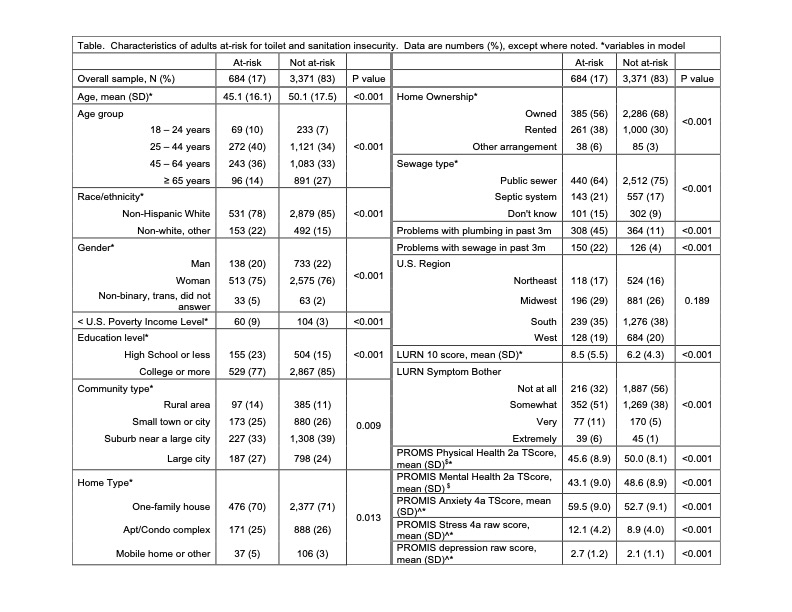Back
Poster, Podium & Video Sessions
Moderated Poster
MP30: Global Health/Humanitarian
MP30-17: Associations between toilet and sanitation insecurity, psychosocial burden, and lower urinary tract symptoms in a sample of U.S. adults
Saturday, May 14, 2022
1:00 PM – 2:15 PM
Location: Room 222
Elisabeth Sebesta*, LeChey Hibbler, Stephanie Gleicher, Roger Dmochowski, Lindsey McKernan, W. Stuart Reynolds, Nashville, TN

Elisabeth Sebesta, MD
Vanderbilt University Medical Center
Poster Presenter(s)
Introduction: While toilet and sanitation insecurities are typically considered global health issues, increasing awareness in the U.S. suggests millions face restricted access to acceptable plumbing and sanitation. This study examines characteristics of US adults who may be at risk for toilet and sanitation insecurity and whether there are associations with psychosocial burdens and lower urinary tract symptoms (LUTS).
Methods: This is a secondary analysis of a sample of 4,055 US adults recruited electronically from ResearchMatch for a study investigating social determinants of health and LUTS. Those with a positive response to either “in the past month, were you worried about having a place to urinate at home?” or “do you worry about plumbing problems or toilets not working in your home?” were considered at-risk for toilet and sanitation insecurity (n=648, 17% of sample). We examined demographic and clinical characteristics (presented in the table) and determined whether there were associations with higher psychosocial burdens (PROMIS anxiety, depression, stress measures) and greater LUTS severity (LURN-10 questionnaire), using descriptive statistics and logistic regression modeling.
Results: Sample characteristics are displayed in the table. Several factors were more common in the at-risk group, including lower age, non-white race, lower education, septic sewer, and problems with sewage or plumbing in the past 3 months. Greater LUTS (OR 1.06, 95% CI 1.04-1.08), anxiety (OR 1.03, 95% CI 1.02-1.05), and stress (OR 1.13, 95% CI 1.09-1.18) symptoms were positively associated with at-risk toilet insecurity, after adjusting for co-variates (those included in model noted in the table). Depression was inversely associated (OR 0.84, 95% CI 0.76-0.94).
Conclusions: This study suggests that U.S. adults who may be at-risk for toilet and sanitation insecurity report more severe LUTS and psychosocial symptoms. As with other social determinants of health, toilet and sanitation insecurity may be an under-recognized contributor to psychosocial distress, especially for individuals with LUTS.
Source of Funding: UL1 TR000445 from NCATS/NIH

Methods: This is a secondary analysis of a sample of 4,055 US adults recruited electronically from ResearchMatch for a study investigating social determinants of health and LUTS. Those with a positive response to either “in the past month, were you worried about having a place to urinate at home?” or “do you worry about plumbing problems or toilets not working in your home?” were considered at-risk for toilet and sanitation insecurity (n=648, 17% of sample). We examined demographic and clinical characteristics (presented in the table) and determined whether there were associations with higher psychosocial burdens (PROMIS anxiety, depression, stress measures) and greater LUTS severity (LURN-10 questionnaire), using descriptive statistics and logistic regression modeling.
Results: Sample characteristics are displayed in the table. Several factors were more common in the at-risk group, including lower age, non-white race, lower education, septic sewer, and problems with sewage or plumbing in the past 3 months. Greater LUTS (OR 1.06, 95% CI 1.04-1.08), anxiety (OR 1.03, 95% CI 1.02-1.05), and stress (OR 1.13, 95% CI 1.09-1.18) symptoms were positively associated with at-risk toilet insecurity, after adjusting for co-variates (those included in model noted in the table). Depression was inversely associated (OR 0.84, 95% CI 0.76-0.94).
Conclusions: This study suggests that U.S. adults who may be at-risk for toilet and sanitation insecurity report more severe LUTS and psychosocial symptoms. As with other social determinants of health, toilet and sanitation insecurity may be an under-recognized contributor to psychosocial distress, especially for individuals with LUTS.
Source of Funding: UL1 TR000445 from NCATS/NIH


.jpg)
.jpg)